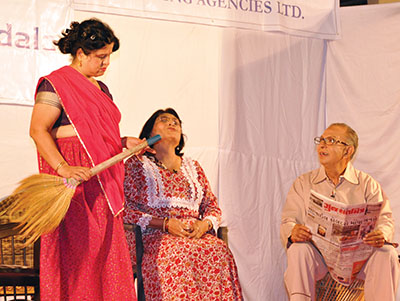Domestics help
Berjis Desai
Parsi men make benign masters of the household. Most maids will concur. The lady may sound a trifle shrill and
crochety and
demanding and
irritating; but the gentleman has a twinkle in his eye and a helpless look which seems to suggest that he is constantly transposing the roles of his wife and the maid. Not that the lady is unaware of her husband’s intentions but she would rather turn a blind eye, so long as the line is not unduly transgressed.
Decades ago, we had visited the K. N. Bahadurji Parsi Sanatorium in Deolali (where in the early part of the last century, terminally ill tuberculosis patients would convalesce, awaiting certain death after having their ribs cut by the surgeon). Though well kept, its environs appeared gloomy, at dusk; its old English style cottages retaining the smell of many deaths. The heaviness was dissipated by a small girl, barely seven, skipping outside the servants’ quarters. Extremely fair complexioned with fine features, she was a picture in contrast to her dusky mother, working in the Sanatorium as a maid. Her father was a Parsi, the maid volunteered. "My daughter has inherited her color from him.” This little girl’s enchanting smile is still embedded in our consciousness.

The maid is often depicted in
nataks as easy prey
Parsi farmers in the villages of Gujarat routinely forged alliances with their domestic help who bore their children. Today, they would perhaps be regarded as common law wives. There was nothing clandestine about these relationships. Gandhian social worker, Burjorji Bharucha with renegade priest, Dastur Framroze Bode performed mass navjotes of these children (‘the Vansda Navjotes’), which, as one would expect, created an uproar. In the decades that followed, stigma soon attached to such relationships.
As a result they went underground. One such employer had his appointment as the Vada Desaiji (who sat next to the Vada Dasturji till
1980s) of Navsari nixed, due to his being spotted exiting from the hut of his longtime help. He was not too bitter about missing the cold adornment at funerals and weddings and continued to enjoy the warmth of the pulsating hut.
At times, the domestics are an oasis of affection for henpecked Parsi husbands. Anecdotally speaking, it is wrong to presume that this so-called affection is induced by monetary consideration alone. Quite often, the attraction is mutual. Harassed by a chauvinist husband, the maid finds succor in her kind and compassionate Parsi employer.
At the risk of being baked in an oven, we must make bold to state that quite a few Parsi men find their Parsi wives rather aggressive and nitpicking. In contrast, the hardworking and docile maid appears to be more optimal spouse material from every perspective. On the other hand, as the Fiddler on the Roof would put it, Parsi ladies are simply unable to fathom as to how their husbands could condescend to be interested in the working class, which unlike them, are not talcum powdered or Eau de Cologned. Will you take your maid to a Zubin Mehta concert or treat her to a romantic dinner at Wasabi? Lust must be the sole motivating factor, these matrons conclude. More often than not, they are wrong. In most compassionate Parsi men, genuine affection arises for the lady who silently serves them, without any weekly break, come rain or sunshine. Silently, being the key word.
We do know of some Parsi men who had the courage of their conviction and married their onetime domestic help. Almost without exception, such marriages have been successful. Society initially frowns, and in due course, forgets and accepts. Such wives are often wary of engaging any domestic help.
One of our acquaintances, who passed away recently, widowed early and was thereafter for a period of 30 years, cared for by his domestic help, also a young childless widow. The bonding between them was touching. He left his entire estate, under his will, to her much to the chagrin of his enraged nephews and nieces. In his last years, he sought our counsel whether he should marry her. He did not follow our advice.
While tales of this symbiotic relationship between master and maid abound, it would be appropriate to mention a young seafaring lad who fell in love with his comely cleaning lady. In a moment of indiscretion, the master and maid forgot to lock the bathroom door; and they were rudely interrupted by his stentorian grandmother who said that she was surprised. (If the lad had heard of the similar predicament of the famous lexicographer,
Dr Webster, he would have replied, "No, Mamaiji, you are astonished. It is we who are surprised.”)
Finally, there was a legend in the by-lanes of Mahim (whom we shall simply call ‘M’) who, clad in
sudreh and lungi, would whistle early in the morning from his terrace to maids proceeding to work. M was a handsome rascal, who perished young after ensnaring many a maid, for love and not money.
Lust may trigger a dalliance, but it often turns into genuine affection, if not exactly love, effortlessly transcending the barriers of caste, race,
class and religion. The ugly exploitative element is mostly absent; with the domestic relishing the attention showered upon her by that sweetheart of a
bawaji.
Berjis M. Desai,
senior partner of J. Sagar Associates, advocates and solicitors, is a writer and community activist.
